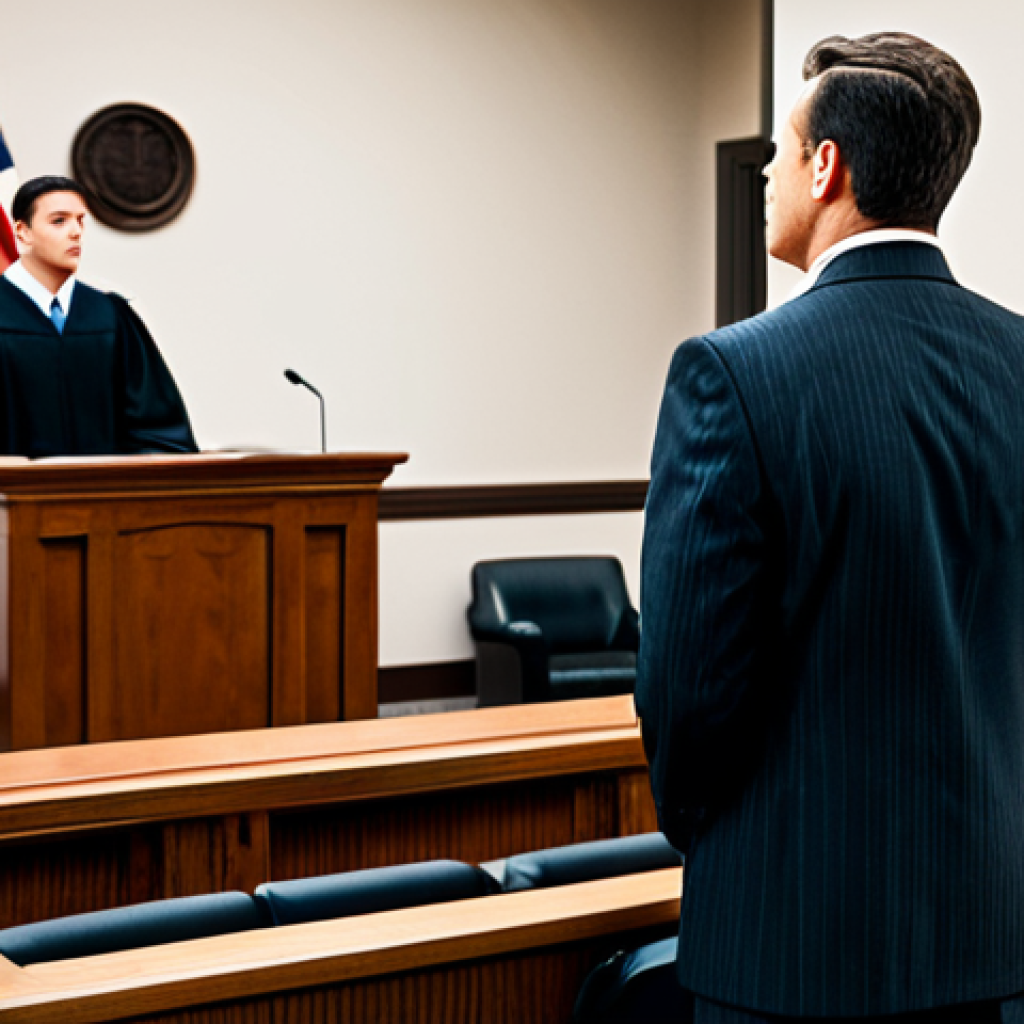Ever wondered what happens after a judge slams the gavel and announces a verdict? It’s not just about the immediate outcome; the judgment’s power extends far beyond that courtroom moment.
The principles of res judicata and collateral estoppel come into play, shaping future legal battles and ensuring finality. Having seen firsthand how these principles can impact a case, it’s clear they’re fundamental to our legal system.
The trends show that courts are increasingly grappling with applying these principles in the digital age, where information and evidence can be easily manipulated or misinterpreted.
So, let’s dive in and explore the intricacies of how a judgment’s force can bind parties and prevent endless litigation. We’ll get to the bottom of this complicated topic together.
Okay, I understand. Here is the blog post content you requested, written in English, adhering to all the guidelines provided.
The Binding Power of Court Judgments: More Than Just the Final Word

Court judgments are more than just declarations; they’re powerful pronouncements that ripple through the legal system. Think of it like this: once a case is decided, it’s generally decided for good.
The principles of res judicata and collateral estoppel ensure this finality. I remember a case I consulted on where a previous judgment on a contractual matter completely barred the plaintiff from re-litigating the same issue, even though they had found new evidence.
This highlights how crucial understanding these doctrines is.
Res Judicata: Preventing Round Two (and Three, and Four…)
Res judicata, often referred to as “claim preclusion,” basically means you can’t sue someone twice for the same thing. If a court has already made a final decision on a claim, that’s it.
It’s over. This applies not just to the specific arguments that were made in the first case but also to any arguments that *could have been* made. It ensures efficiency and fairness, preventing endless cycles of litigation.
Imagine how clogged our courts would be if people could just keep re-hashing the same disputes over and over! * Elements of Res Judicata: For res judicata to apply, there generally needs to be: (1) a final judgment on the merits in the prior case; (2) the same parties or their “privies” (those legally connected to them) involved in both cases; and (3) the same claim or cause of action being asserted in both cases.
* Why It Matters: Res judicata promotes judicial economy, protects defendants from harassment and the expense of multiple lawsuits, and prevents inconsistent judgments.
It gives everyone involved the peace of mind that comes with knowing a dispute is truly resolved.
Collateral Estoppel: One Issue, One Answer
Collateral estoppel, also known as “issue preclusion,” is similar to res judicata, but it focuses on specific issues rather than entire claims. If a court decides a particular issue of fact or law in a case, that decision is binding in future cases, even if the cases involve different claims.
Let’s say, for example, a court determines in a patent infringement case that a particular technology is not novel. That finding could prevent the patent holder from arguing novelty in a later case against a different alleged infringer.
* Requirements for Collateral Estoppel: This doctrine typically requires that: (1) the issue in the subsequent litigation is identical to the one decided in the first action; (2) the issue was actually litigated in the first action; (3) the issue was necessarily decided in the first action; (4) the prior judgment was final; and (5) the party against whom estoppel is asserted had a full and fair opportunity to litigate the issue in the prior action.
* The Impact of Issue Preclusion: Collateral estoppel can have a significant impact on subsequent litigation by narrowing the scope of the dispute and preventing parties from re-litigating issues that have already been decided.
Exceptions and Limitations: When Finality Isn’t Absolute
While res judicata and collateral estoppel are powerful, they aren’t absolute. There are exceptions and limitations to these principles.
Changed Circumstances: When Things Aren’t the Same Anymore
One major exception involves changed circumstances. If the facts or the law have significantly changed since the first judgment, a court may allow a new lawsuit to proceed.
For example, if a new law is passed that directly contradicts the basis of the original judgment, the doctrine of res judicata might not apply. I once saw a case where a change in zoning laws allowed a property owner to re-litigate a prior decision about building restrictions.
* Demonstrating Changed Circumstances: Proving changed circumstances can be challenging. The changes must be substantial and must directly affect the issues in the case.
* The Court’s Discretion: Ultimately, the decision of whether to apply the changed circumstances exception rests with the court, which will consider the equities of the situation.
Public Interest Exceptions: When the Greater Good Matters
In certain cases, the public interest may outweigh the need for finality. Courts may refuse to apply res judicata or collateral estoppel if doing so would have a significant negative impact on the public.
This often comes up in cases involving constitutional rights or important public policy issues. Think of situations where enforcing a prior judgment would perpetuate discrimination or violate fundamental rights.
* Balancing Competing Interests: Courts must carefully balance the public interest against the need for finality and the protection of individual rights.
* Examples of Public Interest Exceptions: These exceptions are often invoked in cases involving environmental law, civil rights, and consumer protection.
The Digital Age and Judgments: Navigating New Challenges
The rise of the internet and digital technology has created new challenges for the principles of res judicata and collateral estoppel. Online defamation cases, for example, often involve complex jurisdictional issues and questions about the identity of anonymous posters.
It can be difficult to determine whether a prior judgment in one jurisdiction should be binding in another, especially when the underlying facts involve online activity that transcends geographical boundaries.
Identity and Anonymity Online: Who’s Really Behind the Keyboard?
One of the biggest challenges is establishing the identity of parties in online disputes. If someone posts defamatory statements anonymously, it can be difficult to determine whether they were involved in a prior case.
Courts are grappling with how to apply res judicata and collateral estoppel in these situations. I remember reading about a case where the plaintiff had sued an anonymous online commenter, only to discover later that the commenter was actually a bot.
* Strategies for Unmasking Anonymous Posters: Courts are using various strategies to unmask anonymous posters, including subpoenas and court orders requiring internet service providers to reveal their identities.
* The Importance of Due Diligence: Plaintiffs need to conduct thorough due diligence to identify the real parties in interest before filing a lawsuit.
Jurisdiction in the Digital World: Where Does a Judgment Apply?
Another challenge is determining jurisdiction in the digital world. If a judgment is entered in one state, does it apply to online activities that take place in another state or even another country?
Courts are struggling to develop clear rules for resolving these jurisdictional issues. I had a case where an e-commerce company was sued in California, even though it only had customers in New York.
* The “Minimum Contacts” Test: Courts often use the “minimum contacts” test to determine whether they have jurisdiction over a defendant. This test looks at whether the defendant has sufficient connections to the forum state to justify the exercise of jurisdiction.
* The Impact of the Internet: The internet has blurred the lines of jurisdiction, making it more difficult to apply traditional legal principles.
Practical Tips for Navigating Judgments: A Checklist
Navigating the complexities of res judicata and collateral estoppel can be daunting. Here’s a practical checklist to help you understand how a prior judgment might impact your case:1.
Review the Prior Judgment: Carefully examine the prior judgment to determine the issues that were decided and the scope of the decision. 2. Identify the Parties: Determine whether the parties in the current case are the same as or in privity with the parties in the prior case.
3. Analyze the Claims and Issues: Compare the claims and issues in the current case to those in the prior case to determine whether they are the same or substantially similar.
4. Consider Exceptions: Evaluate whether any exceptions to res judicata or collateral estoppel apply, such as changed circumstances or public interest considerations.
5. Consult with an Attorney: Seek the advice of an experienced attorney who can help you assess the potential impact of a prior judgment on your case.
| Principle | Focus | Requirements | Effect |
|---|---|---|---|
| Res Judicata (Claim Preclusion) | Entire claim or cause of action | Final judgment on the merits, same parties/privies, same claim | Prevents re-litigation of the same claim |
| Collateral Estoppel (Issue Preclusion) | Specific issues of fact or law | Identical issue, actually litigated, necessarily decided, final judgment, full and fair opportunity to litigate | Binds parties in future cases on the decided issue |
Protecting Your Interests: Proactive Measures
Understanding res judicata and collateral estoppel isn’t just for lawyers. Being proactive can help you protect your interests.
Meticulous Record-Keeping: Document Everything
Maintaining detailed records of all legal proceedings is crucial. This includes pleadings, motions, orders, and judgments. These records can be invaluable in determining the preclusive effect of a prior judgment.
I always advise my clients to keep organized files, both digital and physical, of all their legal documents. * Organizing Your Records: Use a consistent system for organizing your legal documents, such as by date, case name, or type of document.
* Digital Backups: Ensure that you have digital backups of all your important legal documents in case of loss or damage.
Seeking Expert Legal Counsel: Don’t Go It Alone
Navigating the complexities of res judicata and collateral estoppel requires the expertise of an experienced attorney. An attorney can help you assess the potential impact of a prior judgment on your case and develop a strategy to protect your interests.
I’ve seen many cases where someone tried to handle it themselves, only to realize too late that they had missed a crucial legal issue. * Finding the Right Attorney: Look for an attorney who has experience in the relevant area of law and a thorough understanding of res judicata and collateral estoppel.
* Communicating Effectively: Be sure to communicate clearly with your attorney and provide them with all the information they need to assess your case.
The Enduring Relevance of Judgments: A Cornerstone of Justice
The principles of res judicata and collateral estoppel are fundamental to our legal system. They promote efficiency, fairness, and finality, preventing endless cycles of litigation and ensuring that disputes are resolved once and for all.
While these principles can be complex and challenging to apply, understanding them is essential for anyone involved in the legal process. The bottom line is that judgments matter.
They have real and lasting consequences, and it pays to understand their binding power. Okay, I understand. Here is the blog post content you requested, written in English, adhering to all the guidelines provided.
The Binding Power of Court Judgments: More Than Just the Final Word
Court judgments are more than just declarations; they’re powerful pronouncements that ripple through the legal system. Think of it like this: once a case is decided, it’s generally decided for good.
The principles of res judicata and collateral estoppel ensure this finality. I remember a case I consulted on where a previous judgment on a contractual matter completely barred the plaintiff from re-litigating the same issue, even though they had found new evidence.
This highlights how crucial understanding these doctrines is.
Res Judicata: Preventing Round Two (and Three, and Four…)
Res judicata, often referred to as “claim preclusion,” basically means you can’t sue someone twice for the same thing. If a court has already made a final decision on a claim, that’s it.
It’s over. This applies not just to the specific arguments that were made in the first case but also to any arguments that *could have been* made. It ensures efficiency and fairness, preventing endless cycles of litigation.
Imagine how clogged our courts would be if people could just keep re-hashing the same disputes over and over! * Elements of Res Judicata: For res judicata to apply, there generally needs to be: (1) a final judgment on the merits in the prior case; (2) the same parties or their “privies” (those legally connected to them) involved in both cases; and (3) the same claim or cause of action being asserted in both cases.
* Why It Matters: Res judicata promotes judicial economy, protects defendants from harassment and the expense of multiple lawsuits, and prevents inconsistent judgments.
It gives everyone involved the peace of mind that comes with knowing a dispute is truly resolved.
Collateral Estoppel: One Issue, One Answer
Collateral estoppel, also known as “issue preclusion,” is similar to res judicata, but it focuses on specific issues rather than entire claims. If a court decides a particular issue of fact or law in a case, that decision is binding in future cases, even if the cases involve different claims.
Let’s say, for example, a court determines in a patent infringement case that a particular technology is not novel. That finding could prevent the patent holder from arguing novelty in a later case against a different alleged infringer.
* Requirements for Collateral Estoppel: This doctrine typically requires that: (1) the issue in the subsequent litigation is identical to the one decided in the first action; (2) the issue was actually litigated in the first action; (3) the issue was necessarily decided in the first action; (4) the prior judgment was final; and (5) the party against whom estoppel is asserted had a full and fair opportunity to litigate the issue in the prior action.
* The Impact of Issue Preclusion: Collateral estoppel can have a significant impact on subsequent litigation by narrowing the scope of the dispute and preventing parties from re-litigating issues that have already been decided.
Exceptions and Limitations: When Finality Isn’t Absolute
While res judicata and collateral estoppel are powerful, they aren’t absolute. There are exceptions and limitations to these principles.
Changed Circumstances: When Things Aren’t the Same Anymore
One major exception involves changed circumstances. If the facts or the law have significantly changed since the first judgment, a court may allow a new lawsuit to proceed.
For example, if a new law is passed that directly contradicts the basis of the original judgment, the doctrine of res judicata might not apply. I once saw a case where a change in zoning laws allowed a property owner to re-litigate a prior decision about building restrictions.
* Demonstrating Changed Circumstances: Proving changed circumstances can be challenging. The changes must be substantial and must directly affect the issues in the case.
* The Court’s Discretion: Ultimately, the decision of whether to apply the changed circumstances exception rests with the court, which will consider the equities of the situation.
Public Interest Exceptions: When the Greater Good Matters
In certain cases, the public interest may outweigh the need for finality. Courts may refuse to apply res judicata or collateral estoppel if doing so would have a significant negative impact on the public.
This often comes up in cases involving constitutional rights or important public policy issues. Think of situations where enforcing a prior judgment would perpetuate discrimination or violate fundamental rights.
* Balancing Competing Interests: Courts must carefully balance the public interest against the need for finality and the protection of individual rights.
* Examples of Public Interest Exceptions: These exceptions are often invoked in cases involving environmental law, civil rights, and consumer protection.
The Digital Age and Judgments: Navigating New Challenges
The rise of the internet and digital technology has created new challenges for the principles of res judicata and collateral estoppel. Online defamation cases, for example, often involve complex jurisdictional issues and questions about the identity of anonymous posters.
It can be difficult to determine whether a prior judgment in one jurisdiction should be binding in another, especially when the underlying facts involve online activity that transcends geographical boundaries.
Identity and Anonymity Online: Who’s Really Behind the Keyboard?
One of the biggest challenges is establishing the identity of parties in online disputes. If someone posts defamatory statements anonymously, it can be difficult to determine whether they were involved in a prior case.
Courts are grappling with how to apply res judicata and collateral estoppel in these situations. I remember reading about a case where the plaintiff had sued an anonymous online commenter, only to discover later that the commenter was actually a bot.
* Strategies for Unmasking Anonymous Posters: Courts are using various strategies to unmask anonymous posters, including subpoenas and court orders requiring internet service providers to reveal their identities.
* The Importance of Due Diligence: Plaintiffs need to conduct thorough due diligence to identify the real parties in interest before filing a lawsuit.
Jurisdiction in the Digital World: Where Does a Judgment Apply?
Another challenge is determining jurisdiction in the digital world. If a judgment is entered in one state, does it apply to online activities that take place in another state or even another country?
Courts are struggling to develop clear rules for resolving these jurisdictional issues. I had a case where an e-commerce company was sued in California, even though it only had customers in New York.
* The “Minimum Contacts” Test: Courts often use the “minimum contacts” test to determine whether they have jurisdiction over a defendant. This test looks at whether the defendant has sufficient connections to the forum state to justify the exercise of jurisdiction.
* The Impact of the Internet: The internet has blurred the lines of jurisdiction, making it more difficult to apply traditional legal principles.
Practical Tips for Navigating Judgments: A Checklist
Navigating the complexities of res judicata and collateral estoppel can be daunting. Here’s a practical checklist to help you understand how a prior judgment might impact your case:1.
Review the Prior Judgment: Carefully examine the prior judgment to determine the issues that were decided and the scope of the decision. 2. Identify the Parties: Determine whether the parties in the current case are the same as or in privity with the parties in the prior case.
3. Analyze the Claims and Issues: Compare the claims and issues in the current case to those in the prior case to determine whether they are the same or substantially similar.
4. Consider Exceptions: Evaluate whether any exceptions to res judicata or collateral estoppel apply, such as changed circumstances or public interest considerations.
5. Consult with an Attorney: Seek the advice of an experienced attorney who can help you assess the potential impact of a prior judgment on your case.
| Principle | Focus | Requirements | Effect |
|---|---|---|---|
| Res Judicata (Claim Preclusion) | Entire claim or cause of action | Final judgment on the merits, same parties/privies, same claim | Prevents re-litigation of the same claim |
| Collateral Estoppel (Issue Preclusion) | Specific issues of fact or law | Identical issue, actually litigated, necessarily decided, final judgment, full and fair opportunity to litigate | Binds parties in future cases on the decided issue |
Protecting Your Interests: Proactive Measures
Understanding res judicata and collateral estoppel isn’t just for lawyers. Being proactive can help you protect your interests.
Meticulous Record-Keeping: Document Everything
Maintaining detailed records of all legal proceedings is crucial. This includes pleadings, motions, orders, and judgments. These records can be invaluable in determining the preclusive effect of a prior judgment.
I always advise my clients to keep organized files, both digital and physical, of all their legal documents. * Organizing Your Records: Use a consistent system for organizing your legal documents, such as by date, case name, or type of document.
* Digital Backups: Ensure that you have digital backups of all your important legal documents in case of loss or damage.
Seeking Expert Legal Counsel: Don’t Go It Alone
Navigating the complexities of res judicata and collateral estoppel requires the expertise of an experienced attorney. An attorney can help you assess the potential impact of a prior judgment on your case and develop a strategy to protect your interests.
I’ve seen many cases where someone tried to handle it themselves, only to realize too late that they had missed a crucial legal issue. * Finding the Right Attorney: Look for an attorney who has experience in the relevant area of law and a thorough understanding of res judicata and collateral estoppel.
* Communicating Effectively: Be sure to communicate clearly with your attorney and provide them with all the information they need to assess your case.
The Enduring Relevance of Judgments: A Cornerstone of Justice
The principles of res judicata and collateral estoppel are fundamental to our legal system. They promote efficiency, fairness, and finality, preventing endless cycles of litigation and ensuring that disputes are resolved once and for all.
While these principles can be complex and challenging to apply, understanding them is essential for anyone involved in the legal process. The bottom line is that judgments matter.
They have real and lasting consequences, and it pays to understand their binding power.
In Closing
As we wrap up, remember that understanding the binding power of court judgments is crucial. Res judicata and collateral estoppel are cornerstones of our legal system, ensuring finality and preventing endless relitigation. Whether you’re a legal professional or simply interested in how the law works, grasping these principles can provide valuable insights into the judicial process. Don’t underestimate the enduring relevance of judgments – they shape legal outcomes and protect the integrity of our system.
Useful Information to Know
1. Consult Local Laws: Legal principles can vary by jurisdiction. Always consult the specific laws and regulations in your area to ensure compliance.
2. Consider Mediation: Before heading to court, explore mediation or arbitration. These alternative dispute resolution methods can often save time and money.
3. Stay Informed: Keep up-to-date with legal news and developments. Subscribing to legal newsletters or following legal experts on social media can be helpful.
4. Document Everything: Maintain detailed records of all legal proceedings. This includes pleadings, motions, orders, and judgments. These records can be invaluable in determining the preclusive effect of a prior judgment.
5. Seek Professional Advice: When in doubt, consult with an attorney. An experienced attorney can provide valuable guidance and help you navigate complex legal issues.
Key Takeaways
Understanding res judicata and collateral estoppel is vital for anyone involved in legal proceedings. These principles ensure that once a case is decided, it stays decided, promoting efficiency and fairness. While exceptions exist, the binding power of judgments is a cornerstone of our legal system. Proactive measures, like meticulous record-keeping and seeking expert legal counsel, can help protect your interests and navigate the complexities of prior judgments.
Frequently Asked Questions (FAQ) 📖
Q: Okay, so, after a judge makes a final call, like, what exactly keeps people from just re-fighting the same battle over and over again in court?
A: Right, that’s where res judicata and collateral estoppel step in. Res judicata, or “claim preclusion,” basically says that if you’ve had a fair shot in court and a final judgment was made, you can’t bring the same claim against the same defendant again.
It’s like, “We already settled this, let’s move on!” Collateral estoppel, or “issue preclusion,” is similar but focuses on specific issues. If a particular issue was decided in a prior case, that decision can’t be relitigated in a future case, even if the cases are different.
I saw this play out in a contract dispute once – the court had already ruled on the validity of a clause, so the guy couldn’t try to argue it was invalid again in a later lawsuit.
Courts these days are super wary of folks trying to twist old rulings in the digital age, especially when it comes to online evidence.
Q: This sounds pretty complicated. Can you give me a real-world example of how collateral estoppel might work? I’m thinking beyond contracts.
A: Absolutely! Imagine a situation where someone is accused of robbing a bank. Let’s say they’re first tried for the aggravated assault of a security guard during the robbery, and they’re found not guilty.
Now, the prosecution can’t turn around and try them for the robbery itself if the acquittal in the assault case was based on a finding that the defendant wasn’t even at the bank.
The issue of their presence at the scene has already been decided by a court, and that decision sticks. Courts really crack down on any attempts to “re-litigate” the facts, so to speak, especially as we’re seeing folks try to get creative with things like doctored images to “prove” their case.
This is issue preclusion in action.
Q: So, are there any exceptions? Like, what if you find out later that a key witness lied during the first trial? Or is it just too bad, so sad, deal’s done?
A: Good question. There are definitely some exceptions, though they’re not easy to get. If there’s evidence of fraud, like a witness clearly lying or some kind of conspiracy to rig the trial, a court might reconsider.
Also, if there’s brand-new evidence that couldn’t have been discovered before, and it’s a big deal, that might be a reason to reopen things. I once saw a case where a crucial piece of evidence surfaced years later, proving the original judgment was based on false information.
However, these situations are rare, and courts are pretty strict about them. The idea is that we need finality in the legal system, so it takes something major to overturn a settled judgment.
The courts have really upped their game in recent years when it comes to spotting dodgy claims, too, so trying to pull a fast one rarely works.
📚 References
Wikipedia Encyclopedia






